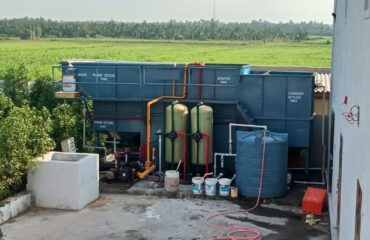As industries continue to evolve and expand, the need for responsible and sustainable waste management becomes paramount. One crucial aspect of this management is the implementation of Effluent Treatment Plants (ETPs). In Ahmedabad, a city known for its industrial prowess, the role of ETPs in maintaining ecological balance and safeguarding public health cannot be overstated.
Understanding Effluent Treatment Plants
An Effluent Treatment Plant (ETP) is a sophisticated system designed to treat industrial wastewater before its discharge into water bodies or reuse. The primary objective of an ETP is to remove pollutants, contaminants, and harmful substances from wastewater, ensuring compliance with environmental regulations and preventing adverse impacts on ecosystems.
The Significance of ETPs in Ahmedabad
1. Industrial Growth and Environmental Impact
Ahmedabad’s rapid industrialization has contributed significantly to its economic growth. However, it has also led to the generation of substantial amounts of industrial wastewater containing pollutants that pose environmental risks. ETPs play a pivotal role in minimizing these risks by treating the effluents before release.
2. Regulatory Compliance
Environmental regulations have become stringent in recent years, mandating industries to adhere to strict effluent discharge standards. ETPs enable industries to meet these regulatory requirements and avoid penalties while demonstrating their commitment to sustainable practices.
3. Protection of Water Resources
Ahmedabad’s water resources, including rivers and groundwater, are essential for both industrial and domestic purposes. ETPs help in conserving these resources by treating and reusing wastewater whenever possible, reducing the strain on freshwater sources.
4. Public Health and Quality of Life
Untreated industrial effluents can contain harmful chemicals and contaminants that can seep into soil and water sources, eventually affecting public health. ETPs prevent such scenarios by treating wastewater to remove hazardous elements.
5. Ecosystem Preservation
Water bodies are ecosystems with delicate balances. Polluted effluents can disrupt these balances, leading to detrimental effects on aquatic life. ETPs ensure that the quality of discharged water is conducive to maintaining the health of local ecosystems.
Challenges and Solutions
1. Diverse Industrial Effluents
Different industries produce distinct types of effluents with varying pollutants. ETPs must be tailored to address the specific characteristics of each effluent type.
2. Technological Advancements
Advancements in treatment technologies, such as biological treatment, chemical processes, and membrane filtration, have made ETPs more efficient and capable of handling complex pollutants.
3. Operation and Maintenance
Regular maintenance and skilled operation of ETPs are essential for their optimal performance. Employing trained personnel and implementing preventive measures can enhance the longevity of these systems.
Conclusion
Effluent Treatment Plants in Ahmedabad are integral to the city’s sustainable growth trajectory. By ensuring the responsible management of industrial wastewater, ETPs contribute to a cleaner environment, healthier communities, and the overall well-being of the city’s ecosystems. As Ahmedabad continues to embrace industrial development, the role of ETPs remains pivotal in maintaining a delicate balance between growth and environmental preservation.





